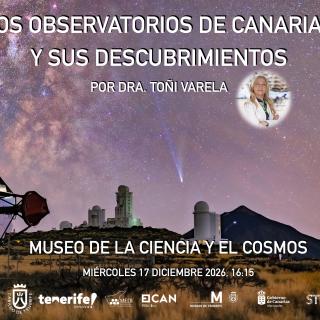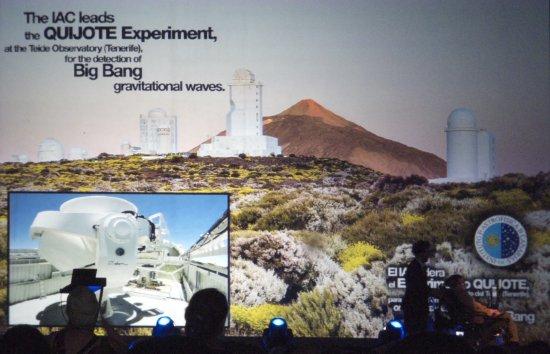It may interest you
-
 El Instituto de Astrofísica de Canarias (IAC) se suma a la conmemoración del Día Internacional de las Mujeres y las Niñas en la Ciencia con un amplio programa de actividades orientadas a visibilizar el papel de las mujeres en la astronomía y fomentar el interés por la ciencia y la tecnología entre las nuevas generaciones. Entre las acciones más destacadas se encuentra la Editatona 11F, organizada junto a Wikimedia España. La iniciativa se articula en dos jornadas complementarias: un wikitaller práctico de introducción a la edición en Wikipedia, en el que las personas participantes aprendenAdvertised on
El Instituto de Astrofísica de Canarias (IAC) se suma a la conmemoración del Día Internacional de las Mujeres y las Niñas en la Ciencia con un amplio programa de actividades orientadas a visibilizar el papel de las mujeres en la astronomía y fomentar el interés por la ciencia y la tecnología entre las nuevas generaciones. Entre las acciones más destacadas se encuentra la Editatona 11F, organizada junto a Wikimedia España. La iniciativa se articula en dos jornadas complementarias: un wikitaller práctico de introducción a la edición en Wikipedia, en el que las personas participantes aprendenAdvertised on -
 El Instituto de Astrofísica de Canarias (IAC) inaugura este miércoles 17 de diciembre una nueva edición del ciclo "Cosmoviaje 2.0. Lo que sabemos e ignoramos del Universo" y lo hará de la mano de la investigadora y directora del Museo de la Ciencia y el Cosmos Antonia Varela quien impartirá su charla " Observatorios de Canarias y sus descubrimientos" a las 16:15 horas. La entrada será libre y gratuita hasta llenar el aforo. Una experta de referencia en astrofísica y divulgación Antonia Varela es doctora en Astrofísica e investigadora del IAC, donde forma parte del Grupo de Calidad de Cielo yAdvertised on
El Instituto de Astrofísica de Canarias (IAC) inaugura este miércoles 17 de diciembre una nueva edición del ciclo "Cosmoviaje 2.0. Lo que sabemos e ignoramos del Universo" y lo hará de la mano de la investigadora y directora del Museo de la Ciencia y el Cosmos Antonia Varela quien impartirá su charla " Observatorios de Canarias y sus descubrimientos" a las 16:15 horas. La entrada será libre y gratuita hasta llenar el aforo. Una experta de referencia en astrofísica y divulgación Antonia Varela es doctora en Astrofísica e investigadora del IAC, donde forma parte del Grupo de Calidad de Cielo yAdvertised on -
 An international team, with participation from the University of La Laguna (ULL) and the Instituto de Astrofísica de Canarias (IAC), have, for the first time, captured a detailed snapshot of planetary systems in an era long shrouded in mystery. The study, called ALMA survey to Resolve exoKuiper belt Substructures (ARKS) , is based on a series of 10 articles published simultaneously in the journal Astronomy and Astrophysics and was carried out using the Atacama Large Millimetre/submillimetre Array (ALMA) . Thanks to this work, the sharpest images ever of 24 debris disks, the dusty belts leftAdvertised on
An international team, with participation from the University of La Laguna (ULL) and the Instituto de Astrofísica de Canarias (IAC), have, for the first time, captured a detailed snapshot of planetary systems in an era long shrouded in mystery. The study, called ALMA survey to Resolve exoKuiper belt Substructures (ARKS) , is based on a series of 10 articles published simultaneously in the journal Astronomy and Astrophysics and was carried out using the Atacama Large Millimetre/submillimetre Array (ALMA) . Thanks to this work, the sharpest images ever of 24 debris disks, the dusty belts leftAdvertised on
